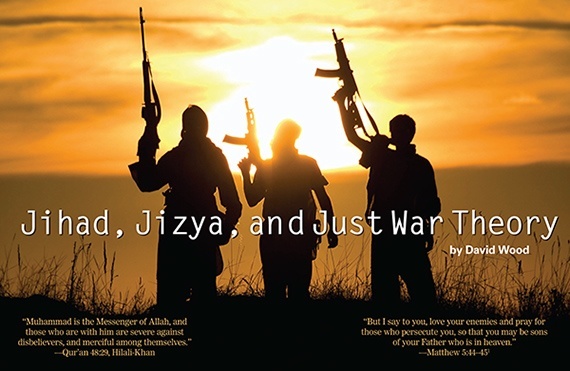This article first appeared in the CHRISTIAN RESEARCH JOURNAL, volume 36, number 01 (2013). The full text of this article in PDF format can be obtained by clicking here. For further information or to subscribe to the CHRISTIAN RESEARCH JOURNAL go to: http://www.equip.org/christian-research-journal/
SYNOPSIS
The Qur’an and other Muslim sources contain both peaceful and violent passages. Muslims in the West (as well as politicians and the media) generally emphasize Muhammad’s peaceful teachings, while jihadists emphasize his more violent and radical commands. Although these “two faces” of Islam may seem opposed to one another, a careful examination shows that peace and violence are separate stages of a larger Islamic program, the ultimate goal of which is the violent subjugation of non-Muslims. According to the Qur’an and the example set by Muhammad, Muslims are to adapt their message and tactics to their status in society. When Muslims are completely outnumbered and can’t possibly win a battle against non-Muslims, they are commanded to promote tolerance as a means of protecting the Muslim community. When their numbers grow sufficient for military action, Muslims are told to defend themselves, through terrorism if necessary, from both persecution and criticism. If Muslims come to dominate a society, they are ordered to subjugate the non-Muslim population actively. Because the requirements and goals of jihad are at odds with the most basic constraints of just war theory, Islam cannot be reformed without abandoning adherence to Muhammad’s commands.
“Muhammad is the Messenger of Allah, and those who are with him are severe against disbelievers, and merciful among themselves.” —Qur’an 48:29, Hilali-Khan
“But I say to you, love your enemies and pray for those who persecute you, so that you may be sons of your Father who is in heaven.” —Matthew 5:44–451
Over the past fourteen centuries, more than 270 million people have been killed in the name of Islam. More recently, the world has seen deadly riots over a novel (Salman Rushdie’s The Satanic Verses), cartoons (published by Danish newspaper Jyllands-Posten), and a poorly made YouTube video (a trailer for a film portraying Muhammad), all of which were deemed blasphemous by Muslim leaders. Since the destruction of the World Trade Center, jihadists have carried out approximately twenty thousand terrorist attacks globally.2
Yet many Muslims, especially in the West, have condemned religious-based violence. Pointing to Qur’an verses such as 2:256 (“There is no compulsion in religion”), they claim that Islam is inherently peaceful, and that terrorism for the sake of Allah is the result of perverting Muhammad’s message. Just as we would not condemn Christianity as a whole because of the actions of people who distort Jesus’ teachings, so also we should not condemn Islam as a whole because of the actions of a minority of “extremists.”
Hence, people of our generation are witnessing two very different faces of Islam—one shouting “Allahu Akbar!” and the other calling for tolerance. Which group represents Islam? Interestingly, they both do, for Islam has different sets of rules for Muslims in different circumstances. Muslims in America who proclaim that Islam is a religion of peace are doing exactly what Islam commands,3 while Muslims in Pakistan who oppress non-Muslim minorities are also doing exactly what Islam commands. Jihad proceeds in stages.
In this article, we will develop a deeper understanding of the Islamic concept of jihad by working our way past two common blunders—namely, (1) that Islam doesn’t call for violence against non-Muslims, and (2) that even if Islam does promote violence towards unbelievers, any long-term threat will be minimal, because Islam, like other religions, can be reformed.
STAGE ONE: STEALTH JIHAD
When Muslims make up only a small percentage of the population of an area, they are commanded to seek peace with non-Muslims and to proclaim a message of tolerance. The revelations Muhammad received during the first decade of his prophetic career (when he had only a few dozen followers) called for a future judgment for unbelievers, but a peaceful coexistence here on earth. A characteristic Qur’an chapter from this period is Surah 109: “Say: O unbelievers! I do not serve that which you serve, nor do you serve Him Whom I serve: Nor am I going to serve that which you serve, nor are you going to serve Him Whom I serve: You shall have your religion and I shall have my religion” (Shakir).
Muslims in the West often quote this Surah to prove that Islam advocates interfaith harmony. But is this really Islam’s final word on unbelievers?
Friendly Faces
One of the key features of Stage One is Taqiyya—concealing the true intentions of the Islamic community in order to guard against attacks from non-Muslims. This tactic was eventually made explicit in Qur’an 3:28: “Let not the believers take disbelievers for their friends in preference to believers. Whoso doeth that hath no connection with Allah unless (it be) that ye but guard yourselves against them, taking (as it were) security” (Pickthall).
This verse forbids friendship with unbelievers, unless Muslims are heavily outnumbered and they feel that they are in danger from a stronger adversary. That’s when Muslims are told to pretend to be friendly. Ibn Kathir, history’s most respected Qur’an commentator, quotes Muhammad’s companions to explain 3:28:
Allah said next, (unless you indeed fear a danger from them) meaning, except those believers who in some areas or times fear for their safety from the disbelievers. In this case, such believers are allowed to show friendship to the disbelievers outwardly, but never inwardly. For instance, Al-Bukhari recorded that Abu Ad-Darda said, “We smile in the face of some people although our hearts curse them.” Al-Bukhari said that Al-Hasan said, “The Tuqyah [variant spelling of Taqiyya] is allowed until the Day of Resurrection.”4
Thus, while Western Muslims cite passages of the Qur’an as evidence that Islam promotes peaceful coexistence with non-Muslims, Muhammad’s companions (who were certainly in a better position to know how to interpret such passages) understood friendly relations with unbelievers as temporary ruses to protect the Muslim community. As soon as Muslims are able to defend themselves against attacks (both physical and verbal), the message of Islam suddenly changes.
STAGE TWO: DEFENSIVE JIHAD
When there are enough Muslims and resources to defend the Islamic community from persecution or criticism, Muslims are commanded to wage defensive jihad—fighting unbelievers who pose a physical or intellectual threat to Islam. Although Muhammad’s followers were originally commanded not to retaliate against persecutors,5 they were given permission to fight after the city of Yathrib (now called Medina) agreed to defend them against attack.6 Few Westerners would object to Muslims fighting in self-defense. However, the definitions of “attack” and “persecution” are much broader in Islam than most non-Muslims realize.
Precedent-Setting Practices
Criticizing Muhammad or Islam was considered an attack, and was met by Muhammad and his followers with physical retaliation.
In Medina, Muhammad began ordering his followers to assassinate critics. Early detractors such as Abu Afak, Asma bint Marwan, and Ka’b bin al-Ashraf7 were all murdered for writing poems about Muhammad or Islam (providing the justification for the modern phenomenon of killing over books, cartoons, or videos). Muslims began following Muhammad’s example by killing those who spoke negatively of their prophet: “Narrated Ali ibn Abu Talib: A Jewess used to abuse the Prophet and disparage him. A man strangled her till she died. The Apostle of Allah declared that no recompense was payable for her blood.”8
Muhammad eventually laid down harsh penalties of death, dismemberment, or imprisonment for the extraordinarily vague crime of “making mischief” in the land: “The punishment of those who wage war against Allah and His apostle and strive to make mischief in the land is only this, that they should be murdered or crucified or their hands and their feet should be cut off on opposite sides or they should be imprisoned; this shall be as a disgrace for them in this world, and in the hereafter they shall have a grievous chastisement” (Qur’an 5:33, Shakir).
Muslim commentators have noted that “mischief” includes unbelief and acts associated with unbelief (e.g., preaching a non-Islamic religion).9 The most extreme form of mischief, however, is establishing a non-Muslim military presence in a Muslim land. The penalty for both the non-Muslim soldiers and those who support or fund the non-Muslim military is death.10
Ignoring Muhammad’s teachings about killing critics and dismembering “mischief makers,” many Muslims in the West have appealed to certain passages in the Qur’an, claiming that Jihad is only defensive fighting. But Muhammad continued delivering revelations to his followers, and his final marching orders had little to do with self-defense.
STAGE THREE: OFFENSIVE JIHAD
When Muslims establish a majority and achieve political power in an area, they are commanded to subjugate non-Muslims violently. Once Mecca and Arabia were under Muhammad’s control, the message of the Qur’an changed yet again—this time from verses advocating defense of the Muslim community to verses calling for oppression of unbelievers. Muslims were no longer commanded only to fight aggressors. They were commanded to fight non-Muslims, simply for being non-Muslims. Consider two verses from Surah 9, the last major chapter of the Qur’an Muhammad delivered: “O Prophet! strive hard against the unbelievers and the hypocrites and be unyielding to them” (Qur’an 9:73, Shakir). “O you who believe! fight those of the unbelievers who are near to you and let them find in you hardness” (Qur’an 9:123, Shakir).
The emphasis in these verses is not on victims defending themselves against oppressors, but on believers (i.e., Muslims) fighting unbelievers. These commands apply when Muslims have the military strength to expand their political power and to subdue non-Muslim populations. The Qur’an even explicitly orders Muslims to subjugate Jews and Christians (the “People of the Book”), forcing them to pay the Jizyah (a kind of tribute paid to Muslim rulers): “Fight those who believe not in Allah nor the Last Day, nor hold that forbidden which hath been forbidden by Allah and His Messenger, nor acknowledge the Religion of Truth, from among the People of the Book, until they pay the Jizyah with willing submission, and feel themselves subdued” (Qur’an 9:29, Ali).
According to Ibn Kathir, “Paying Jizyah is a sign of kufr [unbelief] and disgrace.” He comments: “Allah said, (until they pay the Jizyah), if they do not choose to embrace Islam, (with willing submission), in defeat and subservience, (and feel themselves subdued), disgraced, humiliated and belittled. Therefore, Muslims are not allowed to honor the people of Dhimmah [non-Muslims11 living under Islamic rule] or elevate them above Muslims, for they are miserable, disgraced and humiliated.”12
A Clear Command
In the offensive jihad stage, then, Muslims actively seek out, subjugate, and humiliate Jews and Christians. The justification for carrying out the attacks commanded in Qur’an 9:29 is given in the very next verse: “And the Jews say: Uzair is the son of Allah; and the Christians say: The Messiah is the son of Allah; these are the words of their mouths; they imitate the saying of those who disbelieved before; may Allah destroy them; how they are turned away!” (Qur’an 9:30).
Thus, the culmination of jihad is the conquest of non- Muslims and the establishment of Islamic rule (as we see in Muslim countries such as Saudi Arabia). If Muslims are not in a position to subjugate unbelievers, they are to promote peace and tolerance in areas where they make up a small percentage of the population (as in the United States), and to react violently to persecution or criticism in places where the Muslim community is large enough to fight defensively (as in several African countries and certain areas in Europe).
JIHAD VS. JUST WAR THEORY
While the nature and goals of Islamic jihad are clear, many Western thinkers who study Islamic doctrine are convinced that the violent teachings of the Qur’an pose no significant threat to the world, because Muslim countries will eventually go through a reformation comparable to that of European nations. After all, just a few centuries ago Christians were embroiled in religious wars, yet Christian civilization managed to escape the cycle of doctrine-based bloodshed. Why can’t Muslims do the same?
One obvious response is that, whereas Christians are commanded to “pursue peace with all men” (Heb. 12:14), Muslims are commanded: “Be not weary and faint-hearted, crying for peace, when ye should be uppermost” (Qur’an 47:35, Ali). Thus, a peaceful reformation for Christianity is merely a return to the teachings of the New Testament; a peaceful turn for Islam would not be a reformation, but a transformation into something fundamentally un-Islamic.
Potential for Reform?
We can take our analysis further, however. Although the Bible clearly forbids fighting unbelievers for the sake of Jesus, passages such as Romans 13 suggest an important role for governments in world affairs, even a role that includes physical violence as a form of punishment. Most people, Christian or non-Christian, would grant governments the right both to punish wrongdoers within their own borders and to wage war against other nations under certain circumstances. Since jihad is (ideally, at least) waged by an Islamic state, we must attempt to assess whether the Islamic concept of “fighting in Allah’s cause” can be reformed so that it accords with basic international standards of just warfare.
This brings us to a discussion of just war theory. Analysis of suitable grounds for waging war and of appropriate treatment of enemy combatants was known in the ancient world, both in the West13 and the East.14 However, in the fourth century AD (via Augustine) through the later medieval period (most notably via Thomas Aquinas), Christian beliefs about love, justice, and the responsibilities of human governments were combined with classical Greek and Roman ideas to produce the first major contributions to just war theory. The developments continued into modern times and may be arranged into three categories:
Jus Ad Bellum (“Right to War”). The principles of Jus Ad Bellum are addressed to those with the power to declare war (i.e., heads of state). The main requirement here is having a just cause to declare war, such as self-defense or protecting the victims of tyrannical leaders. Other requirements include just intent (war should only be fought for the right reasons), last resort (all peaceful solutions should be exhausted first), and proportionality (the good outcome sought must outweigh the necessary bloodshed).
Jus In Bellum (“Justice in War”). Once war has been declared, the principles of Jus In Bellum come into focus, mainly dealing with the appropriate treatment of the enemy. The most essential features of Jus In Bellum are the immunity of noncombatants (a soldier may only target someone who is actively attempting some form of harm), proportionality (the tactics or weapons used must be proportional to the desired outcome), and fair treatment of captives (since captives are no longer an immediate threat, they should not be mistreated beyond what is necessary for safety concerns).
Jus Post Bellum (“Justice after War”). When war is coming to an end, the terms of peace must balance (a) correcting the wrongs that led to war with (b) respecting the human rights of the defeated. In general, Jus Post Bellum concerns distinguishing between responsible and nonresponsible parties (punishments should only be directed towards those responsible for waging and fighting the war), reform (steps should be taken to ensure that the injustices that led to the war are not repeated), and compensation (the defeated state may be required to make restitution, but such restitution should not be so excessive that the state is unable to rebuild).
These principles were largely influenced by Christian values, but most of them have become relatively universal by inclusion in the Hague Conventions, the Geneva Conventions, the Geneva Protocols, and various U.N. resolutions.
Here we begin to see why jihad is utterly inconsistent with both the spirit and the principles of just war theory. Christianity’s greatest single contribution to ethics in warfare has been its emphasis on loving everyone, even enemies and persecutors—a concept quite foreign to all ancient societies. In the ancient world, even raw sketches of just war principles depended on some familiarity with the enemy (e.g., “We have trade relations with City X, and we know they are culturally similar to us”). When enemies were utterly different in appearance and values, rules of just warfare simply didn’t apply. It was Christianity that made all men brothers, thus giving dignity to all people (in doctrine, if not always in practice).
But Islam can never subscribe to such a view, because the Qur’an declares not only that Muslims are “the best of peoples” (3:110, Hilali-Khan), but also that those who reject Islam are the “worst of creatures”: “Verily, those who disbelieve (in the religion of Islam, the Qur’an and Prophet Muhammad) from among the people of the Scripture (Jews and Christians) and Al-Mushrikun15 will abide in the Fire of Hell. They are the worst of creatures” (98:6, Hilali-Khan). Needless to say, one cannot base principles of just war on the Islamic teaching that unbelievers are worse than insects.
Jihad is also inconsistent with every level of just war theory. First, as we have seen, the primary justification for warfare in the third stage of jihad is unbelief. Muslims are commanded to fight anyone who doesn’t follow the teachings of Islam. Since just war theory does not require adherence to any particular religious tradition, Jihad cannot be reconciled with the principles of Jus Ad Bellum.
Second, the Muslim sources are filled with examples of Muhammad violating the requirements of Jus In Bellum. For instance, Muhammad commanded his followers to torture a man named Kinana by lighting a fire on his chest in order to find out where some valuables were hidden.16 We have also previously noted that Muhammad had a twisted view of who qualifies as an enemy combatant and that he therefore executed people whose only crime was criticizing him.
Third, following a war, the Qur’an allows Muslims to rape their female captives (even if their husbands are still alive) and to sell the women to other men after doing so.17 When a society is governed by Sharia (Islamic Law), the non-Muslim population is deliberately mistreated and humiliated, in an effort to remind the unbelievers of their inferior status.18
ASSESSMENT
Islam is unique among world religions in that it explicitly calls for the violent subjugation of unbelievers. Western theorists insist that Islam can be reformed, bringing it in line with universal standards of just war theory. However, Islam does not allow Muslims to question or reinterpret the commands of Allah or Muhammad (see Qur’an 33:36). Hence, any attempts to reform the Islamic concept of Jihad will be considered innovation and heresy among Muhammad’s more devout followers.
The three stages of jihad will therefore remain in effect as long as the Qur’an is taken to be the perfect Word of Allah. While Western governments will continue to guard against terrorist attacks, the individual Christian’s greatest weapon against jihad continues to be the gospel of Jesus Christ, which simultaneously calls for universal love among human beings, and undermines the claims of the prophet of Mecca.
David Wood is the host of ABN’s (Aramaic Broadcasting Network) live talk show “Jesus or Muhammad?” He has participated in more than thirty moderated public debates with Muslims in the United States and Great Britain.
NOTES
- All Bible quotations are from the New American Standard Bible.
- The website www.thereligionofpeace.com maintains a running list of Islamic terrorist attacks.
- I don’t wish to give the impression that when a Western Muslim claims that Islam is peaceful, he must be attempting to deceive. Muslims in the West typically believe (albeit incorrectly) that Islam is peaceful. Thus, claims about Islam in this article should be taken as claims about what Islam teaches, rather than about what the average Western Muslim believes.
- Ibn Kathir, vol. 2, 142. Ibn Kathir quotations are taken from the ten-volume Tafsir Ibn Kathir (Riyadh: Darussalam Publishers, 2000). The entire Darussalam edition is also available online at www.qtafsir.com. (Brackets mine.)
- See Ibn Ishaq, Sirat Rasul Allah (The Life of Muhammad), A. Guillaume (New York: Oxford University Press, 1980), 212.
- See Qur’an 22:39–40.
- See Ibn Ishaq, 367–68, 675–76.
- Sunan Abu Dawud, trans. Ahmad Hasan (New Delhi: Kitab Bhavan, 1990), n. 4349.
- See, for instance, Ibn Kathir, vol. 3, 161.
- According to Muhammad, those who financially support soldiers receive the same reward as the soldiers. See Sahih al-Bukhari, trans. Muhammad Muhsin Khan (Riyadh, Saudi Arabia: Darussalam Publishers, 1997), n. 2843. This is why Americans killed in terrorist attacks are not innocent by Islamic standards. Since American citizens support the government and the military (through taxes), they are equally responsible for the actions of the government and military.
- According to Muhammad, only Christians, Jews, and Sabians could be given “dhimmi” status. Other groups under Islamic rule would have to convert, flee to a non-Muslim land, or be exterminated.
- Ibn Kathir, vol. 4, 405–6.
- Cicero (first century BC) presents a Roman account of just war theory in Book One of his De Officiis.
- The Indian epic Mahabharata (fourth century BC or earlier) included a discussion of just war.
- Al-Mushrikun are idol-worshipers.
- See Ibn Ishaq, 515.
- A collection of Qur’an and Hadith passages dealing with the treatment of female captives in Islam may be found in “Muhammad and the Female Captives,” by Silas [pseudonym], http://www.answering-islam.org/Silas/femalecaptives.htm.
- Consider the treatment Christians received under the infamous “Pact of Umar, ”which may be read in “The Onerous Rules and Regulations Imposed on the People of the Book,” by Jacob Thomas, http://www.answeringislam.org/authors/thomas/pact_of_umar.ht










